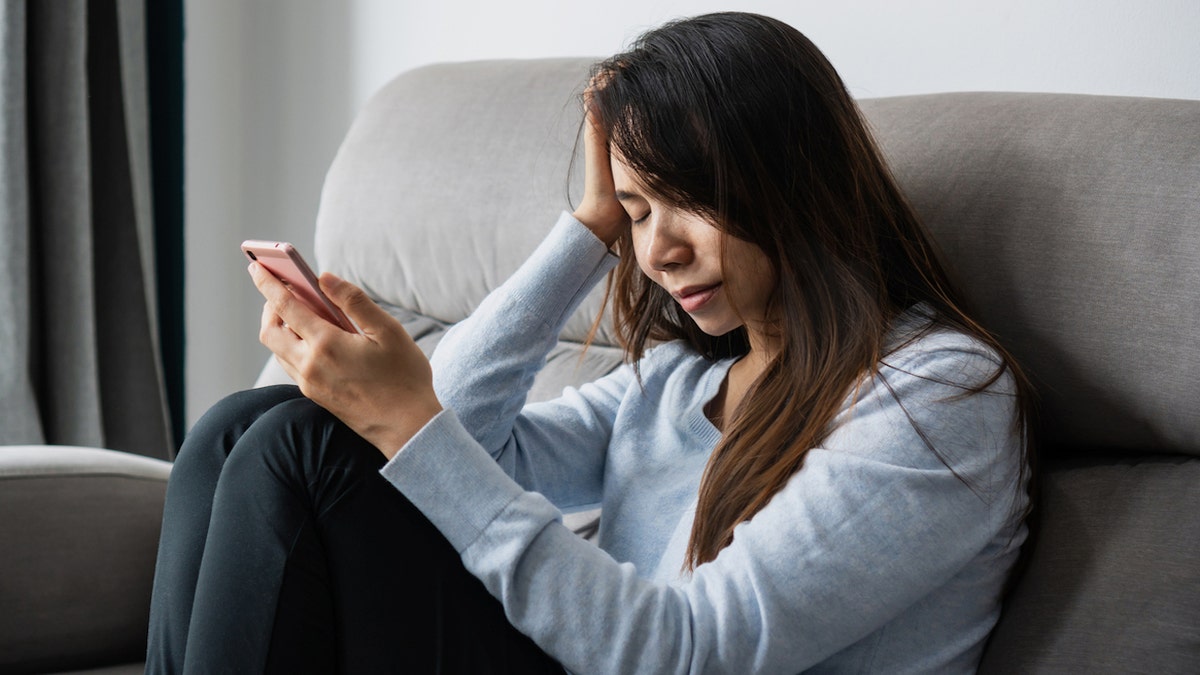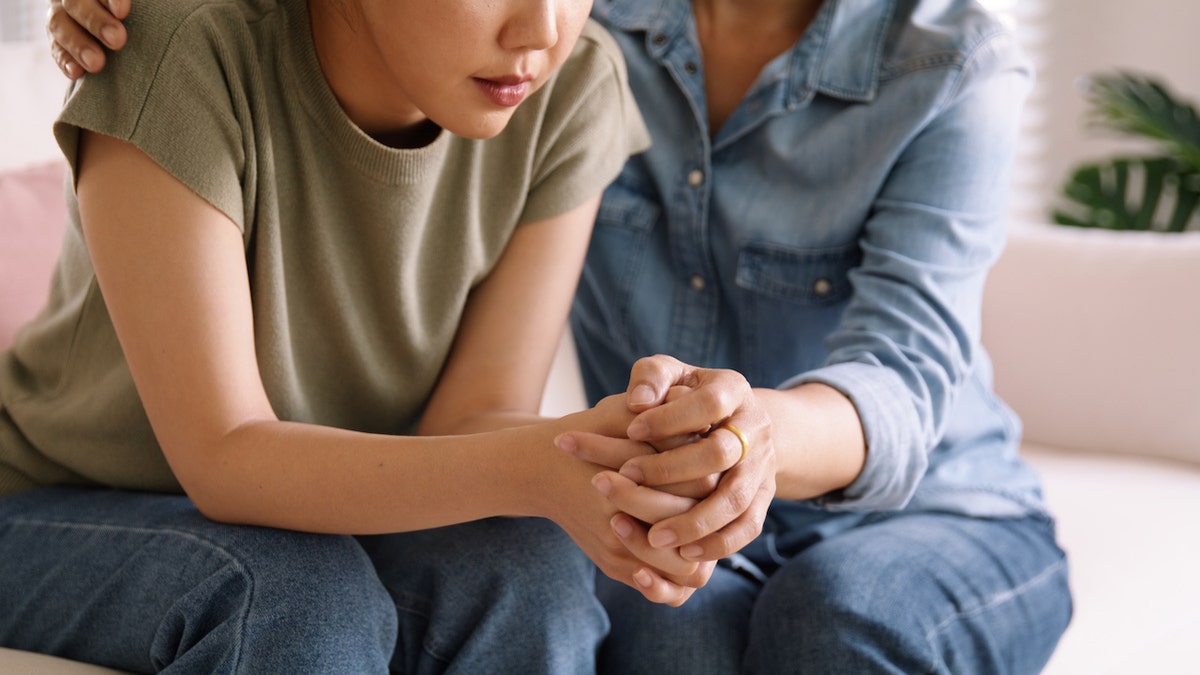
While rising rates of depression and anxiety among American teens have gotten attention, young adults may be struggling even more with those conditions, according to a new report from the Harvard Graduate School of Education.
Approximately 36% of young adults said they struggle with anxiety, compared to 18% of teens.
Regarding depression, 29% of young adults said they experience it, compared to 15% of teens.
SEASONAL AFFECTIVE DISORDER THIS FALL AND WINTER: WISE WAYS TO WARD OFF THE BLUES, ACCORDING TO EXPERTS
These findings came from a national survey sent to young adults ages 18–25, teens and parents in December 2022.
The results were published last week in the report, “On Edge: Understanding and Preventing Young Adults’ Mental Health Challenges,” from Making Caring Common (MCC), a project of the Harvard Graduate School of Education.

Approximately 36% of young adults said they struggle with anxiety, compared to 18% of teens, according to a new report. (iStock)
“Young adulthood can be a time of great growth and possibility,” said Richard Weissbourd, lead author of the report and senior lecturer at the Harvard Graduate School of Education, in a press release from the university.
SUICIDE WARNING SIGNS ARE MISSED BY MOST AMERICANS, NEW SURVEY FINDS: IT’S ‘ALARMING’
“But far too many young adults told us that they feel on edge, lonely and directionless, and that they worry about financial security,” he added. “Many are ‘achieving to achieve’ and find little meaning in either school or work.”
In an interview with Fox News Digital, Weissbourd said he was somewhat surprised by the findings.
“I thought young adults’ rates of depression and anxiety would be high, but I didn’t think it would be twice as high as the rate for teens,” he said. “The extent of the difference was surprising.”
Stressors faced by young adults
The young adults who responded to the survey shared specific challenges that are driving their depression and anxiety.
The most common was a lack of “meaning or purpose,” cited by nearly 58% of the survey respondents.
“At the core, humans are social beings — we need human emotional contact to thrive.”
Half of young adults reported “not knowing what to do with my life,” which contributed to their mental health struggles, the report said.
Financial concerns and pressure to achieve were also named as culprits, affecting 56% and 51% of young adults, respectively.

“Far too many young adults told us that they feel on edge, lonely, directionless — and that they worry about financial security,” the report author said. (iStock)
Forty-five percent of young adults said they had a “sense that things are falling apart.”
For 44% of respondents, lack of meaningful relationships was a key driver and loneliness was a factor for 34%.
7 HEALTHY LIFESTYLE CHANGES THAT COULD HELP REDUCE RISK OF DEPRESSION, SAYS STUDY: ‘ENORMOUS BENEFITS’
“We found high rates of loneliness and high rates of not mattering to other people,” Weissbourd said. “I think the lack of purpose is in part driven by feeling disconnected and lonely.”
Finally, social and political issues contributed to anxiety and depression — 42% blamed gun violence in schools for mental health issues, 34% chalked it up to climate change and 30% cited incompetence or corruption of political leaders, per the report.
“One thing that came up in our data is the amount of frightening news … There’s this feeling like the world is falling apart.”
“One thing that came up in our data is the amount of frightening news — I think that’s a big factor for young people’s rates of anxiety and depression,” the researcher said. “There’s this feeling like the world is falling apart.”
Young people are also in a very different media ecosystem now, Weissbourd noted — “because they are on social media a lot and they’re bombarded with bad news.”
Effects of world events
Dr. Marc Siegel, a professor of medicine at NYU Langone Medical Center and a Fox News medical contributor, was not involved in the Harvard study but said the report “speaks directly to the issue of resilience.”

Forced isolation during the pandemic coupled with heavy social media use could be a recipe for loneliness, a psychologist told Fox News Digital. (iStock)
“Teens are in a better position to adapt and heal coming out of the devastating pandemic, when they were isolated and relying more on social media and texting to communicate,” he told Fox News Digital.
Young adults, on the other hand, were derailed from their pursuits of identity and career, Siegel said — “and their options diminished as businesses closed down.”
YELLING AT KIDS COULD CAUSE LONG-TERM HARM TO THEIR PSYCHES, SAYS NEW STUDY: ‘A HIDDEN PROBLEM’
On top of that, they face a growing inflation rate today, he noted.
“Young adults may respond to a world that is reopening — but with diminished choices — with anxiety and depression,” Siegel said.
“And superimposed on that is now the anxiety of war.”
Impact of loneliness, awkwardness
Dr. Ulrick Vieux, director of child and adolescent psychiatry education and training at Hackensack University Medical Center in New Jersey, was not involved in the Harvard report but shared his take on the findings.

“From my experience, young adults from the age of 18 to 25 are experiencing a high level of loneliness, which leads to a level of social awkwardness that is not completely shared by previous generations,” an expert said. (iStock)
“From my experience, young adults from the age of 18 to 25 are experiencing a high level of loneliness, which leads to a level of social awkwardness that is not completely shared by previous generations,” he told Fox News Digital in an email exchange.
Vieux also noted that this shouldn’t be a surprise, as increasing rates of depression and anxiety in children and teens were well-known even before the onset of the COVID-19 pandemic, which exacerbated these mental health conditions.
FISHING AND ITS HEALTH BENEFITS: THE MORE MEN GO FISHING, THE BETTER THEIR MENTAL HEALTH, STUDY FINDS
“It stands to reason that anxiety, depression and loneliness weren’t just going to resolve themselves as these youths moved to older age brackets, when expectations grow greater as young people go from being children to adults,” he said.
Forced isolation during the pandemic coupled with heavy social media use could be a recipe for loneliness, according to Vieux.

One encouraging quality among today’s young adults, a psychologist said, is that they are more open about sharing their mental health struggles and more willing to seek help. (iStock)
“At the core, humans are social beings — we need human emotional contact to thrive,” he told Fox News Digital.
“If the skillset of forming strong, emotionally satisfying relationships is not established, and is replaced by the frivolity of social media, all of this makes one vulnerable to developing anxiety and depression.”
Strategies for improvement
After detailing the results of the survey of 396 teens, 709 young adults, and 748 parents or caregivers living in the U.S. — plus follow-up consultations with researchers and youth practitioners, including counselors and teachers — the report offered several strategies to help improve young adults’ mental health.
These include placing a greater emphasis on fostering relationships, volunteering, caring for others, and joining clubs or causes.
CLICK HERE TO SIGN UP FOR OUR HEALTH NEWSLETTER
“What’s really therapeutic is helping others — and we should be engaging young people in the service and care for other people,” Weissbourd told Fox News Digital.
He also called for colleges and workplaces to encourage young people to do service of some kind, and to support them in those endeavors.

The report offers several strategies to help improve young adults’ mental health, including placing a greater emphasis on fostering relationships, volunteering, caring for others, and joining clubs or causes. (iStock)
Young people should be encouraged to focus on self-care and work-life balance, added Vieux, “which sometimes falls by the wayside as many work long hours and stay connected to work as they seek to make their mark in their job and rise up the ranks.”
One encouraging quality among today’s young adults, Vieux said, is that they are more open about sharing their mental health struggles and more willing to seek help.
CLICK HERE TO GET THE FOX NEWS APP
“How much that openness and self-awareness may have factored into the results we see in the Harvard study, we can’t know for sure,” he said.
“But there’s undoubtedly a mental health crisis among our young people — and it behooves us to step up to support them by redefining success and stressing the importance of mental health and personal connections.”
For more Health articles, visit www.foxnews.com/health.
 eMedia Bulletin Online News Portal
eMedia Bulletin Online News Portal





